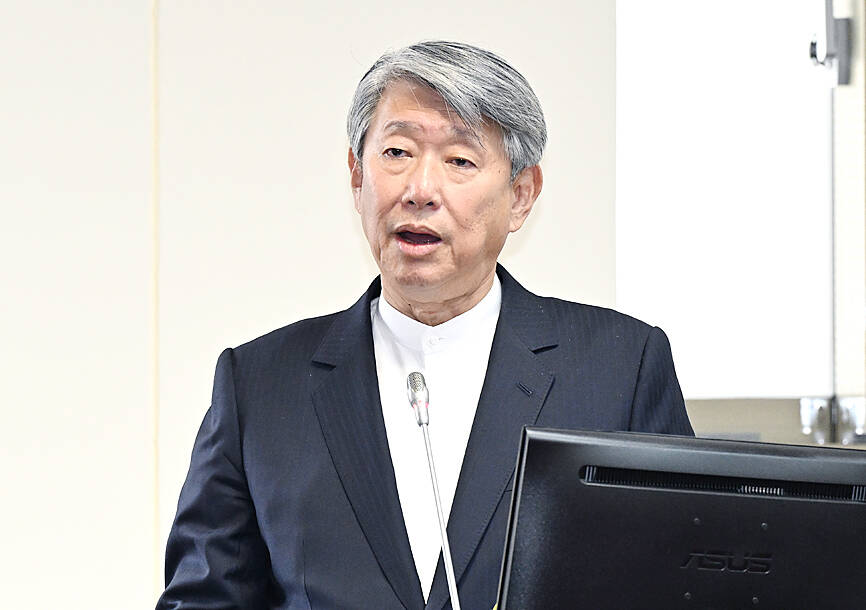Minister of Economic Affairs J.W. Kuo (郭智輝) yesterday defended Taiwan Semiconductor Manufacturing Co (TSMC, 台積電), saying the world’s largest contract chipmaker abides by the law after a report claimed TSMC could face a large fine following an export control investigation by the US Department of Commerce (DOC).
Speaking with reporters on the sidelines of a meeting at the legislature’s Economics Committee, Kuo said as a multinational company, TSMC observes the law in every county it operates, while the ministry has not yet received any information about the possible fine.
Kuo’s comments came after a Reuters report said earlier in the day that TSMC could face a fine of US$1 billion or higher when it aims to settle with the DOC after a recent probe in which a chip made by the Taiwanese company was found in the high-end Ascend 910B artificial intelligence (AI) processor produced by Chinese telecom giant Huawei Technologies Co (華為).

Photo: Liao Chen-hui, Taipei Times
Huawei was placed on a trade restriction list by Washington in 2019 for “national security reasons.”
Citing two unnamed sources close to the matter, the report said the potential penalty of US$1 billion or more comes from export control regulations that allow for a fine of up to twice the value of any transaction that violates the sanction rules.
In the report, Lennart Heim, a researcher at US-based RAND’s Technology and Security and Policy Center, said TSMC in recent years rolled out almost 3 million chips which matched the design ordered by Chinese IC designer Sophgo Technologies Ltd (算能科技) and likely ended up with Huawei.
Heim, who tracks AI development in China, said in the report that based on the design, which is for AI applications, TSMC should not have made the chip for a company headquartered in China, especially given the risk that it could be diverted to a restricted entity like Huawei.
TSMC did not respond to questions about the Reuters report.
In October 2023, TSMC notified the US DOC that one of its chips was found by Techinsights in a Huawei product, in a possible violation of US export restrictions.
At the time, TSMC said it was committed to complying with all applicable rules and regulations, including export controls, and as such has not supplied Huawei since mid-September 2020.
Meanwhile, Reuters also reported that US President Donald Trump said at a Republican National Congressional Committee event on Tuesday that he told TSMC it would pay a tax of up to 100 percent if it didn’t build its plants in the US.
Last month, TSMC pledged to invest an additional US$100 billion in Arizona over the next few years to build three more advanced wafer fabs, two IC assembly plant and one research and development center, on top of a US$65 billion investment it has already planned for building three fabs in Arizona.
Kuo said yesterday that he has faith TSMC will fulfill its investment commitment.
The minister also responded to a lawmaker’s question about GlobalFoundries Inc exploring a potential merger with United Microelectronics Corp (聯電) to create a more resilient maker of mature chips in the US, saying he believed it would not happen.
Additional reporting by Meryl Kao

Shares in Taiwan closed at a new high yesterday, the first trading day of the new year, as contract chipmaker Taiwan Semiconductor Manufacturing Co (TSMC, 台積電) continued to break records amid an artificial intelligence (AI) boom, dealers said. The TAIEX closed up 386.21 points, or 1.33 percent, at 29,349.81, with turnover totaling NT$648.844 billion (US$20.65 billion). “Judging from a stronger Taiwan dollar against the US dollar, I think foreign institutional investors returned from the holidays and brought funds into the local market,” Concord Securities Co (康和證券) analyst Kerry Huang (黃志祺) said. “Foreign investors just rebuilt their positions with TSMC as their top target,

REVENUE PERFORMANCE: Cloud and network products, and electronic components saw strong increases, while smart consumer electronics and computing products fell Hon Hai Precision Industry Co (鴻海精密) yesterday posted 26.51 percent quarterly growth in revenue for last quarter to NT$2.6 trillion (US$82.44 billion), the strongest on record for the period and above expectations, but the company forecast a slight revenue dip this quarter due to seasonal factors. On an annual basis, revenue last quarter grew 22.07 percent, the company said. Analysts on average estimated about NT$2.4 trillion increase. Hon Hai, which assembles servers for Nvidia Corp and iPhones for Apple Inc, is expanding its capacity in the US, adding artificial intelligence (AI) server production in Wisconsin and Texas, where it operates established campuses. This

H200 CHIPS: A source said that Nvidia has asked the Taiwanese company to begin production of additional chips and work is expected to start in the second quarter Nvidia Corp is scrambling to meet demand for its H200 artificial intelligence (AI) chips from Chinese technology companies and has approached contract manufacturer Taiwan Semiconductor Manufacturing Co (TSMC, 台積電) to ramp up production, sources said. Chinese technology companies have placed orders for more than 2 million H200 chips for this year, while Nvidia holds just 700,000 units in stock, two of the people said. The exact additional volume Nvidia intends to order from TSMC remains unclear, they said. A third source said that Nvidia has asked TSMC to begin production of the additional chips and work is expected to start in the second

US President Donald Trump on Friday blocked US photonics firm HieFo Corp’s US$3 million acquisition of assets in New Jersey-based aerospace and defense specialist Emcore Corp, citing national security and China-related concerns. In an order released by the White House, Trump said HieFo was “controlled by a citizen of the People’s Republic of China” and that its 2024 acquisition of Emcore’s businesses led the US president to believe that it might “take action that threatens to impair the national security of the United States.” The order did not name the person or detail Trump’s concerns. “The Transaction is hereby prohibited,”